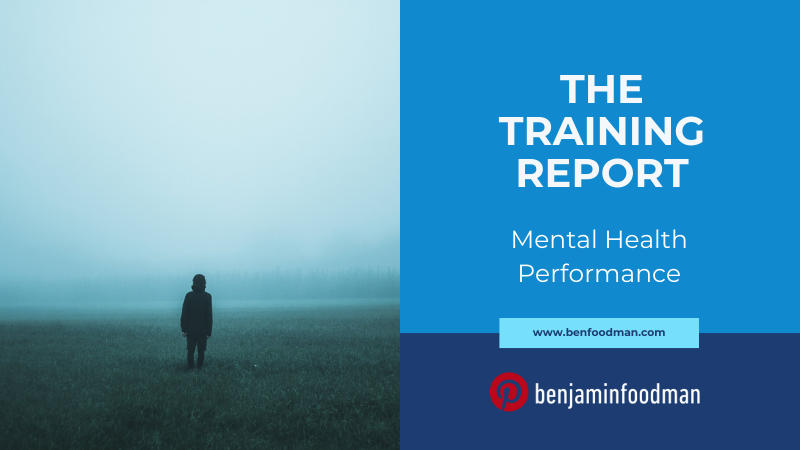How Can Psilocybin & Brainspotting Help Athletes With Trauma?
About the Author
Ben Foodman is a licensed psychotherapist & performance specialist. He owns his private practice located in Charlotte North Carolina where he specializes in working with athletes to help them overcome mental blocks (the yips), PTSD, ADD / ADHD and achieve flow states through the techniques of Brainspotting & Neurofeedback. If you are interested in services, use the link here! Enjoy the article below!
Disclaimer: The Training Report is presenting a theoretical concept to specifically advance discussions on this subject and should not be conducted without having consulted doctors and/or trained medical professionals.
Introduction: Brainspotting & Psilocybin
The field of psychological healthcare is continuously developing a wide variety of new and promising mental health treatments. Cognitive behavioral therapy, dialectical behavioral therapy, motivational interviewing and other techniques are used to help patients navigate psychological obstacles. While these treatments have been helpful for many clients, a growing number of mental healthcare professionals recognize that these treatment modalities have a ‘ceiling’ to them, unable to consistently help patients address the underlying ‘why’ behind their mental health concerns. Even all of the advancements within psychopharmacology cannot truly help patients completely eradicate these issues. While research methodology must remain the guiding principle behind discovering effective treatment interventions, we need to recognize that ‘evidence based therapy’ also has significant limitations for patients. We need look no further than the continued substance use epidemic and rampant mental health crises that the United States has been facing .
Many of the patients who suffer from these ailments have access to mental health clinics that require clinicians utilize ‘evidence-based treatment’, yet patients continue to struggle with their psychological health. Because of this, I want to discuss potential alternative treatment methods that I believe need to be researched and discussed much more frequently. For this Training Report, I want to review the relatively new treatment options of Psilocybin & Brainspotting, how they can potentially help patients, and why we should consider a multi-modal approach using these interventions. I want to explore both the known science of these treatments, the theoretical concepts associated with these treatments and why mental health practitioners with the proper resources should start to investigate whether these interventions can be utilized. First, let’s start off by exploring what psilocybin is and how it affects humans from a psycho-dynamic psychotherapy perspective.
Part I. Neuroscience Of Psilocybin
Psilocybin is a psychedelic pro-drug compound that is made by more than several hundred different species of fungus. The most powerful of the fungus species is considered to be Psilocybe These mushrooms are widespread and are commonly found growing on manure. In terms of how the body interacts with Psilocybin, it is converted into Psilocin which is a Tryptamine molecule (LSD is also considered a Tryptamine molecule). Tryptamine is described as ‘a type of organic compound distinguished by the presence of two linked rings, one of them with six atoms and the other with five’. Tryptamines are submersed throughout nature which are found in fungi, plants, and other organisms acting as signaling molecules between cells. Interestingly, a Tryptamine molecule that is most well known is Serotonin. This is important because Serotonin can have a significant effect on mood, learning, memory and other psychological functions. Apart from this coincidence, there are other compelling reasons to explore clinical use for Psilocybin.
There is debate about how the psychological effects of this compound provide a ‘transcendence’ effect. But one thing that many people within this field of research seem to be in agreement on is the appearance of the ‘dissolution’ of the ego. In the article Ego-Dissolution And Psychedelics: Validation Of The Ego-Dissolution Inventory the authors cite how alterations or distortions of the individual experience of ‘self’ or ‘ego’ are a hallmark feature of using psychedelics. They also go on to cite additional research that has regularly observed decreases in ‘the self-referential awareness’ when individuals have used psychedelics. The authors elaborate on the experience of psychedelics in the following quote ‘This experience has been interpreted from a psychoanalytic perspective as a disruption of ego-boundaries, which results in a blurring of the distinction between self-representation and object-representation, and precludes the synthesis of self-representations into a coherent whole’ (Nour et al, 2016). Now that we have reviewed some of the theoretical concepts behind how Psilocybin affects us, let’s review what Brainspotting is and how it can impact clients.
Part II. Brainspotting, The Yips/Mental Blocks & Neuroscience
In previous Training Reports, I have discussed what Brainspotting is, but let’s review in more detail the mechanics behind this application. Brainspotting is a technique used in psychotherapy to help patients access unprocessed experiences stored in the subcortical brain, and process those experiences in a fast and powerful way. However, because Brainspotting is such an intense therapy intervention, individuals with severe trauma can sometimes have too intense of an experience due to the fact that Brainspotting activates psychological defenses that patients had to develop in order to survive their trauma. While these defenses helped patients survive, they also keep individuals in a chronic state of stress. Unfortunately, these defenses preserve the trauma and prevent patients from being able to move closer to psychological homeostasis. However, activating these defenses is necessary as it will theoretically help bring to conscious awareness the patients unconscious defensive behaviors and the somatic memory of the trauma stored in the body.
Authors from the article Brainspotting: Sustained attention, spinothalamic tracts, thalamocortical processing, and the healing of adaptive orientation truncated by traumatic experience go on to elaborate on the phenomenon of Brainspotting ‘This will require, among other things, the therapist to help the patient to work on more focused and defined frames as a way to promote the healing and the processing by parts or pieces of the experience. One way to do so is to consider and identify the inner complexity of the divided system: the Partsi of the personality that have been fragmented and that cohabit the intrapsychic world of the client, turning it into a complex or a very complex system which normally is in conflict. All the processing with Brainspotting naturally comprises an implicit process of the experience contained in the different survival sub-sytems involved in coping with the traumatic threat (they match the biological survival systems: attachment crying, fight, flight, faked death, freeze, total submission and collapse). In the processing we can observe how the different survival subsystems reveal the information associated with the experienced story’ (Corrigan, Grand & Raju, 2015). Now that we have reviewed some of the mechanics behind Brainpotting technique, let’s finish by reviewing the theoretical application of combining this with psychedelic prescription.
Part III. Combining Brainspotting & Psychedelics
There is a significant body of research that supports the multi-modal approach of utilizing talk therapy with psycho-pharmacology. Patients with mental health concerns that utilize both medication and talk therapy will have significantly better treatment outcomes compared to those that don’t. But as our understanding of neurology, therapy and medicine expand, we need to also expand our treatment approach options. As previously stated, evidence based therapy approaches certainly bring into awareness distorted thinking patterns, but do not appear to consistently address the underlying reason for why the patient is experiencing what they are experiencing. Furthermore these treatment interventions only put the client in a position to process their issues from a neocortical perspective, whereas the intervention of Brainspotting helps the patient to potentially process from the subcortical areas of the brain. This is important because as previously mentioned psilocybin affects the individual’s ego state, and our subcortical brain connectivity providing an opportunity for people to experience the ‘transcendence’ effect allowing patients to develop deep insight into their mental health issues.
Combining this with the experience of Brainspotting could theoretically offer a synergistic effect allowing clients with deep trauma to finally reach breakthroughs in therapy that were not previously possible. While the research is promising on psilocybin and psychedelic prescription, more research and funding for those studies needs to be completed. As of right now, much of the significant research into psychedelic use to treat mental health issues is being conducted at the Johns Hopkins Center for Psychedelic & Consciousness Research. More research also would need to be done in Brainspotting and the efficacy of Brainspotting with psychedelics. Patients interested in receiving treatment for psychedelics should consult their physicians first and need to understand that psychedelics will not work well with every individual, and that treatment interventions that utilize psychedelics require clinical supervision and trained medical professionals to help keep patients safe. Nonetheless, we should remain hopeful and optimistic about promising treatment modalities that are being developed for the effective treatment of mental health concerns!
Note To Reader:
If you are an athlete reading this segment of the TRAINING REPORT, hopefully this content was helpful! I put the Training Report together because I felt like many of the discussions on issues such as the Yips/mental blocks, strength training & other subject matter on athlete performance concepts were really missing the mark on these ideas (e.g. how trauma is the direct cause of the Yips). If you are interested in learning more, make sure to subscribe below for when I put out new content on issues related to sport psychology & athlete performance! Also, if you are looking to work with a mental performance specialist, you are in the right place! USE THIS LINK to reach out to me to see if my services are the right fit for your goals!
ARE YOU ON THE LIST?
Make sure you’re signed up to Ben’s mailing list to receive news & updates on new strategies in sport psychology, upcoming workshops & products. Don’t wait, sign up now!

































